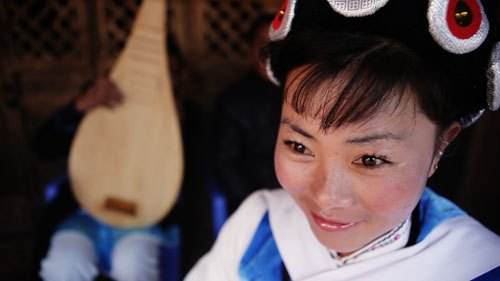
In 1998, He Limin started teaching people in his village about Dongba culture in his courtyard home. Dongba is the name for the culture and language of the Naxi people, who live in and around the city of Lijiang in China's Yunnan province.
He Limin, Researcher, Lijiang Institute of Dongba Culture.
 |
|
A musician performs during a gathering to celebrate the expansion of a school teaching Naxi culture. [Photo: CRIENGLISH.com] |
"The original name was the Lijiang Study Hall of Naxi Culture. It's a non-government group, which I've funded myself. There was no external financing. Myself and the other teachers taught in our spare time. That's why our school has been a night school. We are dedicated to spreading the Dongba culture in our spare time."
There are many elements to Dongba culture - music, a written language said to be the only living one based on hieroglyphics, and a rich set of customs and rituals which Mr He says are in danger of being forgotten.
"For me, the most crucial thing we do here is to reconstruct the Naxi culture. It's difficult to preserve every element of Naxi culture as it used to be, so we try out best to protect the most important parts according to the present day needs of our society. As long as we can find a way to integrate it into modern society, traditional culture can be saved. We can't stay stuck in the past - we have to adapt our traditional ways to the modern society."
In the early days of the school it was the women in the village who were most interested in studying Dongba culture, so the school has so far focused on teaching them, but Mr He is now re-branding and re-launching the school to attract anyone interested in Dongba culture, from Chinese of other ethnic groups to foreigners.
"We still have no outside funding, but now we're changing the school. We're planning to run it in an enterprising way. We'll make it a business, and have paid services. We'll educate people and at the same time, spread Dongba culture. We'll open to everybody - It doesn't matter if they are foreigners or Chinese people, if they want to study, we will teach them. But we'll charge for this. Not for our individual benefit, but to spread the culture on to the next generation."
At a re-opening ceremony to celebrate the re-branding of the school, local officials from around Lijiang came to give speeches and voice their support for the project. At the end of the ceremony, Naxi men performed a dance for those in attendance.
"Every dance has its own story and meaning. The differences in the dancing reflects the differences in the stories. Different spirits, different forms and different meanings. The dance with the sword is called the North Spirit Dance. A spirit in the north holds a sword in it's hand and makes sacrifices to different gods with each dance. Dongba Dance is based on sacrifice. The elements of Dongba culture are: Dongba characters, Dongba Scripture, Dongba dialects, Dongba music, Dongba dance and arts. There are more than 100 ceremonies."
Mr He is hoping to expand the school in the future, to secure funding from government and private sources, and to bring schools like his to other Naxi villages in the Lijiang area. He says he made a promise to friends and teachers, who have since passed away, to spread the Naxi Dongba culture and keep it alive.
"Dongba culture is important because it came from Naxi people. We generated this ancient language, which took much effort. Many other ethnic groups have lost their original language, but we Naxi people have kept ours alive. We still know the meaning of every single word. We do not need to guess. We can read all the classical scriptures, and sing them out loud. We still know how to use this language. It's a rare thing in the context of globalization and homogenization in the modern world. We believe this culture is a precious thing to be protected, and that we must pass it on. Some Naxi people' s belief in the culture has worn thin and some have altered their beliefs. However, there are still some Naxi people who stick to their original faith and cultural customs."